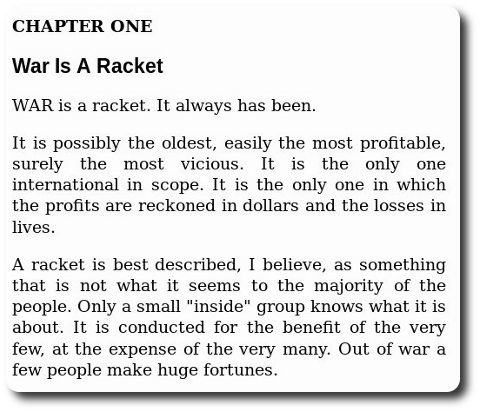

Reference: War Is A Racket
This morning we spotted a very misleading headline, courtesy of Luciano Ricondo from Ladas & Parry LLP. Software patents are not patent-eligible anymore (or hardly so, even if the USPTO accepts them before they reach a high enough court that tosses them out), but this article is just the typical listing of very exceptional cases where CAFC somehow accepted a software patent or two (an appeal can still have these invalidated). Why are we still seeing such articles? Just look who the authors are, they try to sell their services.
"In reality, especially when it comes to code (software), copyrights provide sufficient protection and there is virtually no need for software patents (these are harder to get and a lot harder actually enforce anyway)."Secrecy rather than patents may work better sometimes and considering the breadth of patents out there, it's more likely that a small company will get sued (or extorted by a patent troll) than be in a position to sue some other company using a patent or two. It's just expensive and risky. In fact, this new article from Asterion Inc (US) stresses "the advantages of trade secret litigation," highlighting it as a better option than patent litigation. In reality, especially when it comes to code (software), copyrights provide sufficient protection and there is virtually no need for software patents (these are harder to get and a lot harder actually enforce anyway).
The discussion about software patents in New Zealand, a common ground for lobbyists of firms like IBM and Microsoft, seems to be back with this report about "[p]ossible changes to NZ divisional patent practice". We haven't quite heard of it elsewhere, but thankfully, as far as are aware, the country has no software patents or a trolls epidemic -- something which there's a growing number of instances of in Europe (thanks, EPO!) and fewer in the US, owing to much-needed changes at the USPTO.
"The bottom line is, the patent system should restrict patent grants to few ideas that are actually novel and ground-breaking, not become enslaved by the mirage of quantity of patents as surrogate/function of innovation."A subject which we mentioned not too long ago was the use of machines not only to examine patents but also generate and file patents. A bunch of computers generating patents to be examined by other computers would result in billions of crappy patents that only computers can process (and make no sense of anyway). A Web site called Futurism has just published an article about that ("When an AI Invents Something, It Should be Credited as the Inventor"). Well, patents are a dime a dozen now (low quality), with about 10 million of them in the US alone, so machines are already needed to deal with the chaos/maze, based on this new article from Innography Inc (US). We need stop patent maximalism because it renders the whole patent system too chaotic for people to keep abreast of (even just in their own field/domain) and it leads to a lot of litigation, patent thickets, etc. Maybe one day there will be a proportion of patents that is computer-generated and people won't be able to distinguish these from 'real' patents crafted by actual humans. Then, other issues may crop up, for instance the existence (or inexistence) of an actual investor. Today there's this new article which says: "Normally, if Client A and Lawyer A have a confidential communication, disclosure of it to a third party waives any privilege. However, if Client A and the third party have a “common interest,” there is no waiver. So, for example, if a licensor communicates with patent prosecution counsel for the licensee about prosecution of a foreign counterpart of the licensed patent, there might be a privilege."
A system wherein there's just a bunch of machines talking to one another would completely distort the very notion of innovation. What would be the point of such a system?
The bottom line is, the patent system should restrict patent grants to few ideas that are actually novel and ground-breaking, not become enslaved by the mirage of quantity of patents as surrogate/function of innovation. Only a clueless, antiscientific, deranged individual like Battistelli would make quantity rather than quality the primary goal, while at the same time pondering (allegedly) replacing examiners with machines or giving up examination altogether (so any machine can automatically generate as many patents as it's capable, even if it's all gobbledygook). ⬆